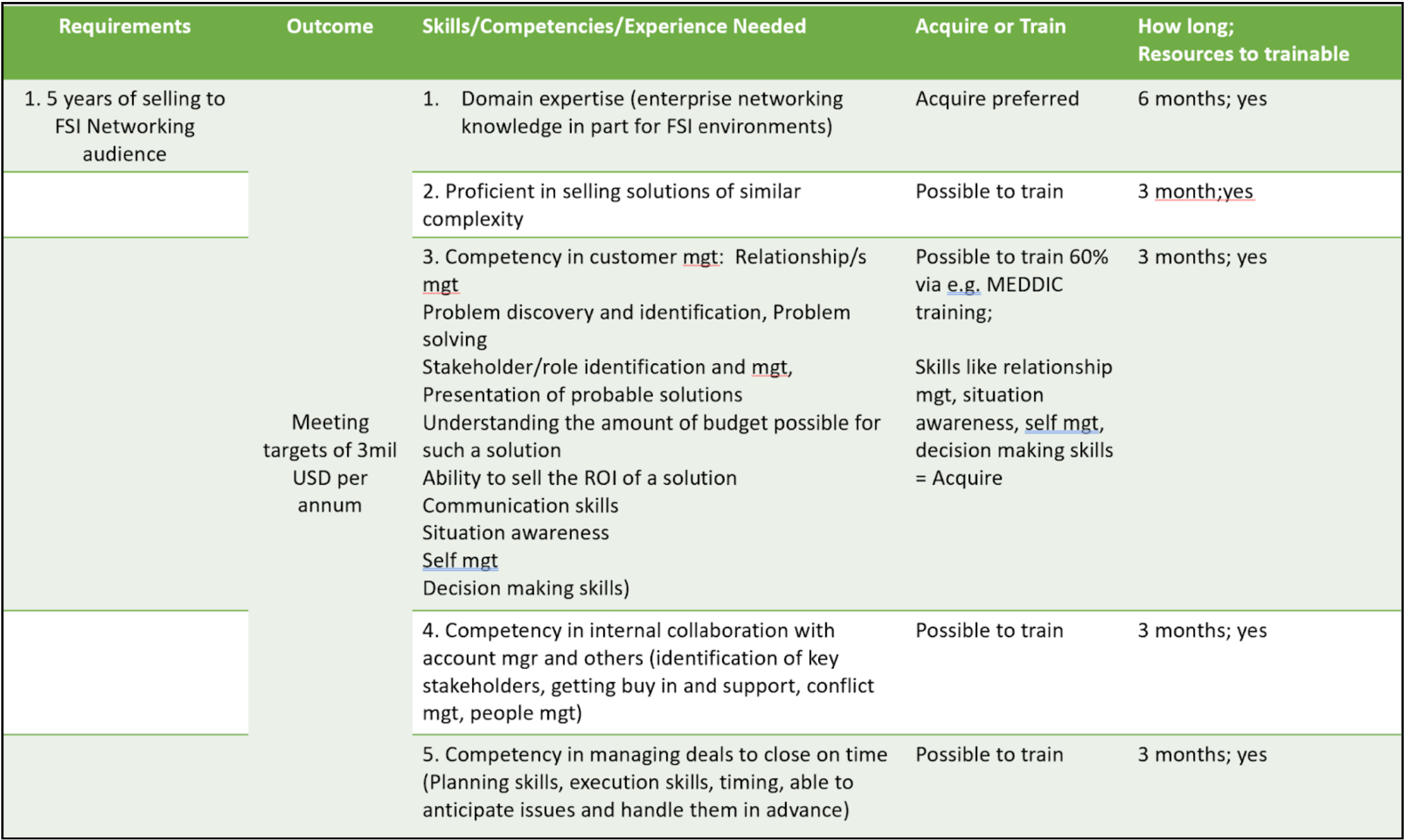Years ago, I pitched our headhunting services to a very, very large IaaS vendor (who was small then in Singapore) and they wanted people who could sell IaaS. No, they don't want candidates from infrastructure companies because they are not selling it in this model, or looking at it from a client’s consumption approach, and that they “sell and disappear”.
The problem is the companies selling it in that model aka “as a service” can be counted with 1 hand then.
I said the pool is limited. If you are growing exponentially and only want to hire the top 5%, there are less than 3 A players available to join you. If the plan is to build a team of 12 sellers in the next 1 year, we have to think creatively, what skill/competencies/experience can be trained versus acquiring them outright and paying for it? The more you can train, the less you are affected by talent pool limitations (and paying a high price for it).
Looking at a typical IaaS offering…If the underlying solution is made up of servers, storage, network, its interconnects, some virtualizing & provisioning software...basically everything an infra seller would be expected to sell, can we then find such a person who has a genuine customer satisfaction attitude to prevent the “sell and disappear” possibility? Someone who cares about the usage, the post purchase satisfaction, someone who is able to sell/service the client year in, year out? I believe so. Track record is one way to tell. Raving customer references is another. Can the ROI of IaaS conversation be trained? It certainly can.
This is especially useful for when applying in tech. Because if we look at "perfection" or like for like, or "exact match", we can hit a wall in a heartbeat.
Instead of looking for RPA talents from competition, perhaps BPM experience will be relevant too.
Instead of Docker/Kubernetes experience, maybe we can look at people with experience in cloud platforms + devops + linux + programming languages like Java, Node etc.
Instead of IaaS AEs somewhere, look for Infra sellers with a client-oriented, usage mindset.
Breaking down the requirements and asking the question - why do we need this hard skill or experience, can help us open up the talent pool without compromising on the quality of candidates. After all, each time a new hot tech skill appears on the scene, it is not possible to find x years of experience of such candidates.
It takes effort to break these down. Most TAs, hiring managers, and agencies find it easier to check through the requirement boxes because it is simply easier on the mind and to be honest, a less antagonistic conversation to have.
But trust me, these questions are worth asking.
Looking at each requirement and asking ourselves, what is the outcome we are hoping to get out of that requirement?
When we have the real ask, it is easier to search and interview for such skills, competencies and experience, with the intended outcome as the guide.
Otherwise, it's merely interviewing for a list of what the person should have, not what that person can do (skills/competencies), have done (experience) and will do it (motivation - big topic for next time) again for you.
Let’s deep dive and let me draw an example here.
A networking software vendor is looking to hire an AE with experience selling to the FSI networking audience. The requirements look like this:
- 5 years of sales experience in enterprise networking software (SDN, WAN, etc)
- Proficient in engaging a C suite audience, being a trusted advisor
- Dynamic, start-up mentality, good communication skills
If money is no issue, we can simply throw enough money and the candidates will be motivated at some point to come. However it is probably not the case, hence within the market pool’s salary range, we have to find the A pool that will best fit the job and the environment.

1. List the most important criteria and what specific outcome will having each of those criteria translate to?
e.g. What does 5 years of selling networking knowledge translate to? Versus say 4 years. 3 years? It is not actually the number of years doing activity x but the outcome we are looking at is to sell networking solutions to that audience successfully and likely independently to meet the target quota.
2. Then it should translate to a number of needed Skills/Competencies/Experience (see diagram)
But core personal skills like these are harder to train and most would prefer to acquire them straight out and at an advanced level preferably:
c. Areas you can afford to train and how long will it take for the candidate to be effective
After we drill down to the nuts and bolts, then we can perhaps balance our assessment for each candidate: reviewing their strengths, gaps and ability to learn (so that your training will be effectively applied in the field). We have to keep in mind these things rather than defaulting to screening hard skills and tenure.
In my opinion, it is pretty hard to train a bunch of soft skills for e.g. customer management as it requires the trainee to be motivated to practice, make mistakes, get feedback, practice repeatedly, and have the environment to practice it, often with years of application, just to be good. The capacity to learn fast, and learn well is a very precious skill.
Personally, the more advanced soft skills the candidate possesses, combined with an exceptional ability to self-learn, the more I can discount the lack of hard skills and experience.
With this, hopefully, it guides you as you look at each candidate’s strengths, gaps, and learning potential, where to give up hard skills in exchange for potential.
Else, we will be chasing perfection and getting the “mixed up chameleon” if there’s really one out there.
If you would like a copy of the “cheat sheet” diagram above, feel free to email me This email address is being protected from spambots. You need JavaScript enabled to view it..

